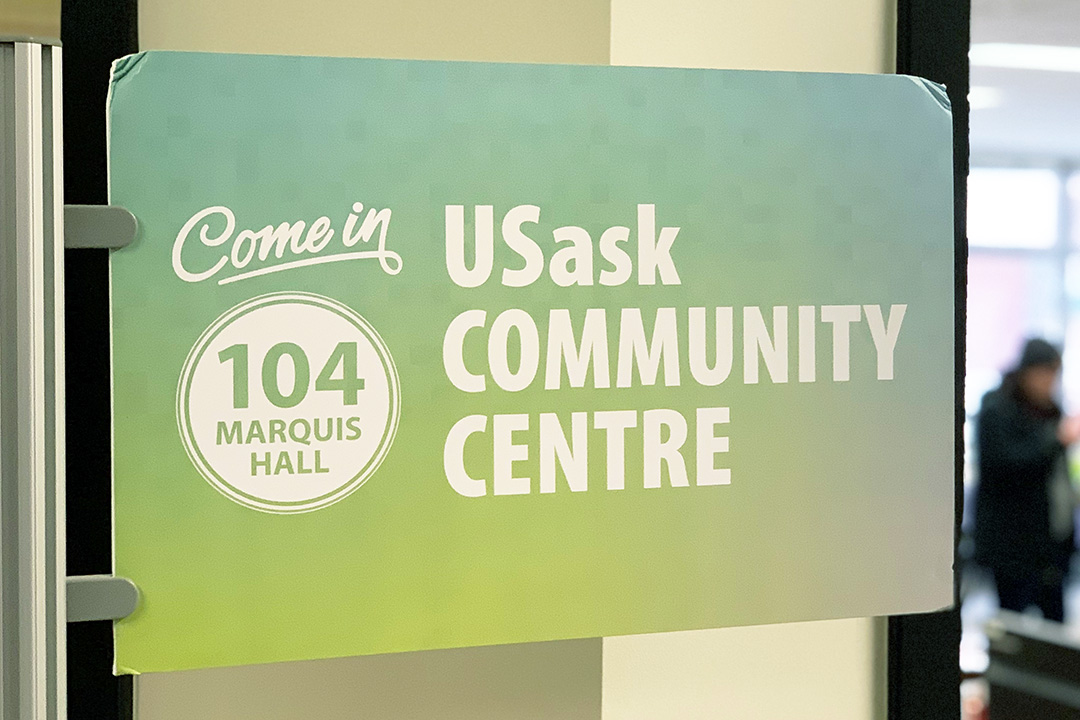
New community centre opens on USask campus
The University of Saskatchewan (USask) has officially opened the USask Community Centre, located in Marquis Hall on the Saskatoon campus.
The centre has bookable space for wellness-related activities, such as yoga and healthy eating classes, is the home base for Peer Health, a student health education group, and is frequented by university faith leaders, who offer spiritual guidance and support.
“It is well known that a sense of belonging, acceptance and connection are foundational to health and well-being,” said Peter Hedley, director of Student Supports and Services. “Spaces like this one, that offer an opportunity for students to find a sense of belonging and build community, are vital.”
Building on the strong connection between being part of a community and staying mentally healthy, the opening of the centre coincides with Bell Let’s Talk Day, a national mental-health awareness campaign developed by Bell Canada.
“It’s not uncommon for post-secondary students to report stress levels increasing and being so busy with their studies they don’t even have time to spend with friends. Now, at the community centre, students can pop in to grab an apple or a free breakfast, take a free yoga class, get some peer support or talk through an issue with a faith leader,” said Hedley. “By locating this space right in the centre of campus, we have made it a bit simpler for students to stop by, catch their breath and feel a part of something.”
The Government of Saskatchewan is an important partner in supporting mental health and wellness. In 2019, the province committed $75,000 to build capacity in mental health and wellness training at the province’s post-secondary institutions, including at USask. Training and certification started last fall and continues in 2020.
“As a government we have invested a record amount in mental health and wellness training,” said Minister of Advanced Education Tina Beaudry-Mellor. “It’s important that students have a space where they can access some of the supports that are available to them.”
Shiney Choudhary came to study at USask from New Delhi, India, and joined Peer Health in her first year. Choudhary said the friends she made through Peer Health were with her through the good and tough times as an undergraduate student.
“I developed leadership skills, grew my friend circle and learned to cope with academic struggles,” said Choudhary, currently a program co-ordinator at the USask Community Centre and a USask alumna. “Raising awareness about health issues has helped me improve my own lifestyle and be better at supporting people around me. I am grateful for the opportunities that Peer Health has offered me and will continue to offer through the USask Community Centre.”
In 2017, staff and faculty from across campus and Peer Health members worked together to develop a wellness strategy with the goal of creating and maintaining an environment that promotes the health and well-being of all who work and study at USask campuses.
Hedley said key services and supports, like the USask Community Centre, were created or reconfigured because of the wellness strategy. The wellness document commits to supporting and promoting student wellness within a number of dimensions, including social, emotional, intellectual, nutrition, rest, substance use, physical activity, sexual health, safety and self-care, career, academic, volunteerism, spiritual, financial and environmental.
Hedley said the Peer Health program has been around for more than 20 years and aligns with the wellness strategy by approaching wellness in a multi-dimensional way. The USask Faith Leaders program was developed as a direct response to the changing demographic of the student community and a recognition of the increasing need to provide faith-based support on campus.
“We often talk about professional supports—such as the medical services found at our Student Wellness Centre—but we need more than a clinical response to support student health and well-being,” said Hedley. “A multi-dimensional response is vital. This includes access to such things as wellness-related learning opportunities, peer support, community connection and spiritual wellness supports—all resources that I’m proud to say can be found at the new USask Community Centre.”

